Do you want to lose weight effectively? See your doctor and get these tests done

Are you planning to lose weight? Before you change your diet and reduce your calorie intake, see your doctor. Gaining weight may be a signal of the development of the disease and should not be ignored. See what tests are worth doing before switching to a reducing diet.
Weight gain is a symptom accompanying various types of diseases. The list includes hypothyroidism, type 2 diabetes and polycystic ovary syndrome (PCOS). Therefore, if you are overweight or obese, consult a doctor before taking any steps to lose excess weight. To effectively combat the problem of excessive body weight, you need to know its cause.
Blood tests necessary before losing weight
One of the basic tests that are worth doing before losing weight is blood count. Contrary to appearances, it provides a lot of information about your health. It allows you to detect anemia and infections, as well as assess the general hydration status of the body. Please remember that drinking the right amount of fluids is very important in the process of losing excess weight. Water reduces appetite, supports the functioning of the digestive system and accelerates the metabolic rate.
Before going on a diet, you should check your hormone levels in your body. It is worth paying special attention to TSH concentration test – thyrotropin, a hormone that controls the functioning of the thyroid gland. Its excess or deficiency (compared to the generally accepted norms typical for age and gender) may indicate the development of diseases within the organ. To obtain a more complete picture of thyroid function, it is also worth checking the concentration of FT3 and FT4. It is also a good idea to check your testosterone levels. Its increase is one of the signals indicating the occurrence of polycystic ovary syndrome (PCOS).
If you want to lose weight healthily, don’t forget to measure yourself blood glucose levels. Its excess generally indicates the development of type 2 diabetes or prediabetes. These are dangerous metabolic disorders that, if left untreated, may lead to various complications. This is not only about overweight and obesity, but also many other health problems, such as diabetic retinopathy, diabetic foot syndrome and kidney failure.
It is also good to perform the so-called lipidogram (lipid profile). This simple blood test provides information on the level of total cholesterol and its individual fractions (HDL – commonly called “good cholesterol” and LDL, i.e. the so-called bad cholesterol), as well as triglycerides.
Additionally, liver function will be assessed by so-called liver tests, i.e. liver function tests. Thanks to them, you can check the activity of enzymes important for the proper functioning of the organ, including alanine aminotransferase (ALT) and aspartate aminotransferase (AST).
Before you go on a diet, also perform a urine and stool analysis. These tests will detect abnormalities in the functioning of the kidneys and intestines.
Who sends you for tests before losing weight?
Pre-weight loss tests can be performed on the National Health Fund. However, you should first ask for a referral from your family doctor. You can also perform the tests privately. In such a situation, no referral is required. However, you have to pay for the tests. Their cost can reach up to several hundred zlotys. It all depends on the number of tests performed, as well as the location and reputation of the facility. Regardless of where and how the tests are performed, it is worth remembering that it is the doctor who interprets the results. You should not do this on your own if you do not have the appropriate medical knowledge. Remember that when assessing individual health indicators, various factors are taken into account, not only the indicated standards. If there are indications, the primary care physician may refer the patient to other specialists, for example an allergist or endocrinologist.
If you want your weight loss to bring lasting and positive results, ask a dietitian for help in establishing an appropriate diet that will take into account your energy needs and eating habits. Losing weight will not be hard work or a lot of sacrifices if you approach it wisely.






